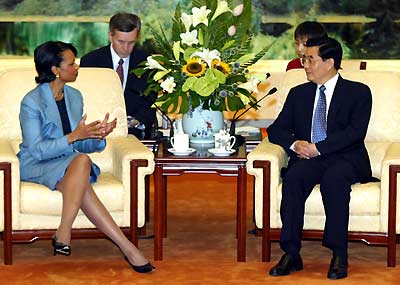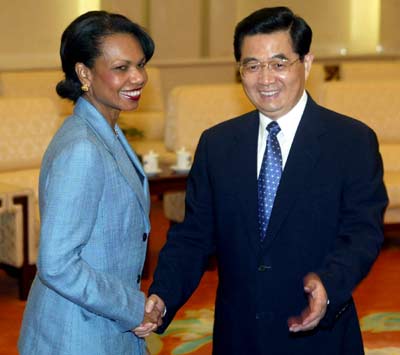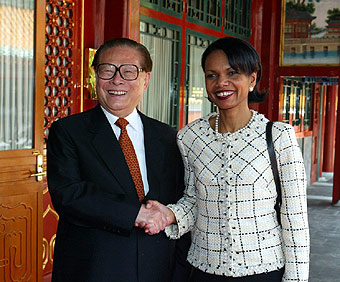|
Hu urges US not to send wrong signal to Taiwan
(Xinhua)
Updated: 2004-07-09 14:43
Chinese President Hu Jintao urged the United States to honor its commitments on the Taiwan issue and not send wrong signal to the Taiwan authority to avoid damage to the peace and stability across the Taiwan Strait.

Chinese President Hu Jintao (right) meets with U.S. National Security Adviser Condoleezza Rice in Beijing's Great Hall of the People July 9, 2004. [Reuters] |
Hu made the remarks while meeting with US National Security Advisor Condoleezza Rice in Beijing Friday morning.
The Taiwan issue is closely related with China's sovereignty and territorial integrity, Hu said, noting that the key to the sound and stable development of Sino-US ties is to properly handle the Taiwan issue.
China will adhere to the principles of "peaceful reunification" and "one country, two systems" on the Taiwan question, and is willing to make utmost efforts with greatest sincerity to resolve the issue by peaceful means, the president said.
But China shows no tolerance to the Taiwan independence nor allow anyone to split Taiwan from China, he stressed.
"It was the common aspiration and strong determination of the 1.3 billion Chinese people to safeguard sovereignty and territorial integrity," the president said.
US President George W. Bush has clearly reiterated that the United States sticks to the one-China policy, observe the three Sino-US joint communiques and opposes to Taiwan independence, he said.

Chinese President Hu Jintao (right) greets U.S. National Security Adviser Condoleezza Rice in Beijing's Great Hall of the People July 9, 2004 before they start talks. [Reuters] |
China hopes the US side to translate the commitments into concrete actions and send no wrong signal to the Taiwan authority so as to avoid damage to the peace and stability across the Taiwan Straits, Hu said.
After reviewing positive progress made in Sino-US ties in recent years, Hu said that the importance of Sino-US ties and common interests shared by the two countries increased rather than reduced amid great changes in the international situation.
Sino-US relations face new opportunities as well as new challenges, he added.
In line with mutual respect, equality and seeking common ground while leaving differences aside, the Chinese government is willing to work with the US side to enhance dialogue and consultation, properly handle differences and the other's concerns, expand and deepen mutually beneficial cooperation so as to push forward the sound and steady development of Sino-US constructive and cooperative relations, Hu said.
Rice told Hu that the US-China ties were developing in a positive way and with unprecedented depth and width.
China is changing greatly and a strong and confident China is in the interest of the United States, she said, adding that the US side is willing to strengthen relations with China, expand economic and trade cooperation and keep dialogue on problems with different views.
President Bush understands the sensitivity of the Taiwan issue and he will honor his commitments, stick to the one-China policy and the three US-China joint communiques, and render no support tothe Taiwan independence, she said.

Chairman of Chinese Central Military Commission Jiang Zemin shakes hands with visiting U.S. National Security Adviser Condoleezza Rice in Beijing July 8, 2004. [newsphoto] |
Rice arrived in the Chinese capital Thursday noon as guest of Chinese Foreign Minister Li Zhaoxing.
During her 24-hour stay in Beijing, Rice conferred with Chairman of the Chinese Central Military Commission Jiang Zemin, State Councilor Tang Jiaxuan and Li Zhaoxing, respectively.
China is the second-leg of Rice's Asian tour. In Tokyo before her Beijing visit, she held talks with Japanese Prime Minister Koizumi Junichiro and Foreign Minister Kawaguchi Yoriko. In Seoul, Rice is expected to confer with ROK leaders.
Rice had visited China in February 2002 when she accompanied Bush on a working visit.
|